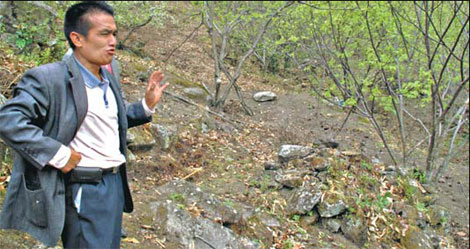Life
Changing fortunes
Updated: 2011-04-19 08:47
By Chen Liang (China Daily)
|
Yang Zhixue at his chestnut tree farm. |
I find it hard to believe that the stout farmer standing in front of me, in trousers, coat, black leather shoes, a mobile phone sticking out of his leather belt, and talking with pride about his chestnut trees is the same person I interviewed during my first trip to Baihualing village in Baoshan, Yunnan province, 15 years ago.
I met Yang Zhixue, then 32, in his thatched bamboo hut. The ethnic Lisu man tried to serve me water from a big pot whose insides were caked with a thick layer of cornmeal, evidence of the pot having been used repeatedly to cook meals.
His young daughters were playing in the mud in front of his house, half-naked.
The destitution was so shocking that I can recall it vividly to this day.
I was there to report on the Gaolingong Mountain Farmers' Association for Biodiversity Conservation (FABC). Established in Baihualing on Dec 8, 1995, with support from the United States-based MacArthur Foundation and the Gaolingong Mountain National Nature Reserve, it is the country's first farmers' NGO working in the field of environmental protection.
Yang was among FABC's first 65 members. He joined the association so he could avail himself of the seedlings provided by the reserve administration and its guidance on planting cash crops such as coffee, chestnut and walnut.
"My family had only some 10 mu (0.67 hectare) of hilly land near the reserve then," he says. "Before 1996, I planted corn on it, which brought in an annual profit of 2,000-3,000 yuan ($306-458) - 4,000 yuan at most. It was simply not enough."
Encouraged by the reserve managers and other members of FABC, he started planting chestnut trees in late 1995. And life has not been the same since for Yang and his family.
Specials

British Royal Wedding
Britain's Prince William and his girlfriend Kate Middleton get married on April 29.

The final frontier
Xinjiang is a mysterious land of extremes that never falls to fascinate.

Bridging the gap
Tsinghua University attracts a cohort of foreign students wanting to come to China.
